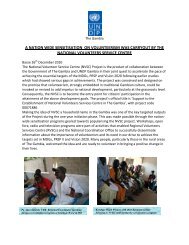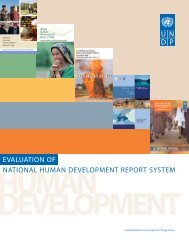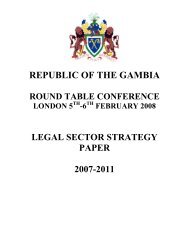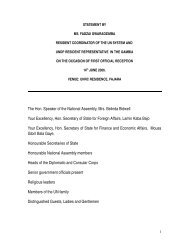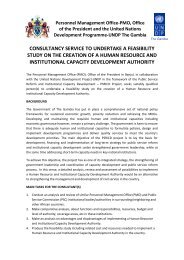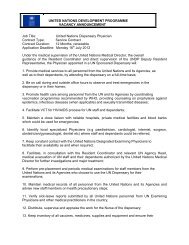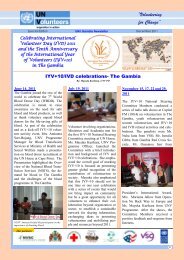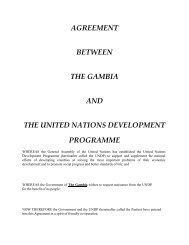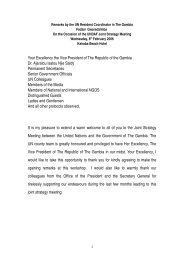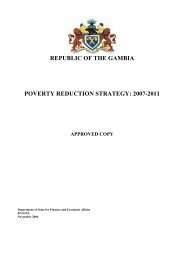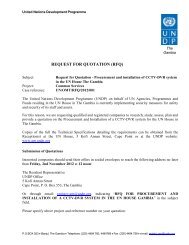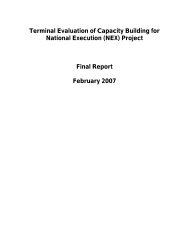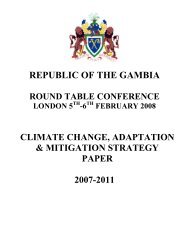Introduction - UNDP The Gambia
Introduction - UNDP The Gambia
Introduction - UNDP The Gambia
Create successful ePaper yourself
Turn your PDF publications into a flip-book with our unique Google optimized e-Paper software.
________________________________________________________________________________________________________________________<br />
development plans to resource the activities<br />
in order to attain the MDGs and other<br />
development plans, to promote popular<br />
participation and empowerment of the poor<br />
through policy directives that will provide the<br />
enabling environment to improve their status<br />
and to support the MTP/PRSP with special<br />
funds geared towards the communities.<br />
Recommendations<br />
Eradicating extreme poverty and hunger:<br />
All local government areas and<br />
municipalities, especially the rural<br />
communities, experienced significant<br />
increases in poverty between 1992 and 1998.<br />
It is noted that <strong>The</strong> <strong>Gambia</strong> needs an annual<br />
reduction of 2 per cent in overall poverty and<br />
1.1 per cent reduction in food poverty<br />
between the years 2000 and 2015. To reduce<br />
the level of poverty, the supportive<br />
environment should be available and specific<br />
attention should be paid to the vulnerable<br />
groups, namely the rural poor, the youth and<br />
women in particular.<br />
A girl-friendly schools initiative is currently<br />
being encouraged by the Forum for African<br />
Women Educationalists - <strong>Gambia</strong><br />
(FAWEGAM) and the UNICEF education<br />
project to create awareness about girls’<br />
education and the returns by using role<br />
models in the community, protecting girls<br />
from sexual harassment and preventing girls<br />
of school-going age from marrying too early.<br />
Reducing child mortality and improving<br />
maternal health: To strategically address<br />
maternal mortality, more support and<br />
attention should be given to the existing<br />
traditional actors in the community ,eg TBAs,<br />
traditional healers and herbalists, whose role<br />
is to care for the sick. To provide the support<br />
needed on a sustainable basis, a philosophy of<br />
health care that will remain with the<br />
community when the resources from donors<br />
are waning should be developed. This<br />
requires full commitment from the<br />
government to support the decentralisation<br />
process.<br />
Achieving universal primary education and<br />
promoting gender equality and<br />
empowerment of women: <strong>The</strong> problems<br />
associated with education are not necessarily<br />
financial but cultural. If one takes the efforts<br />
made by the government, achievements in<br />
increases in enrolment in primary education<br />
are due to increased investments in both<br />
human and financial resources. <strong>The</strong><br />
underlying factors are due to people `s<br />
attitudes, among other things.<br />
<strong>The</strong> education system should involve the<br />
VDCs from the planning stage to the<br />
implementation of the programme.<br />
Communities should have a say on how they<br />
want the system to respond to their needs and<br />
those of their children. Government should<br />
provide the infrastructure needed for all the<br />
children to access schools within a reasonable<br />
distance. It should also sensitise the<br />
communities to the need to contribute to the<br />
sustainable development of the schools by<br />
creating awareness about the importance of<br />
education.<br />
A curriculum by which the health sector will<br />
engage the local citizenry to identify ways of<br />
addressing maternal health problems in the<br />
community needs to be created, including a<br />
primary health care system that promotes the<br />
environmental sanitation and well-being of<br />
the citizenry.<br />
Women of reproductive age should be part of<br />
the decision-making process regarding their<br />
reproductive health, and taking responsibility<br />
for their reproductive life. Also, more TBAs<br />
need to be trained to take charge of deliveries<br />
in the communities, with adequate resources<br />
provided for the management of the system.<br />
Combating HIV/AIDS, malaria and other<br />
diseases: Various groups should be engaged<br />
on a social mobilisation campaign with the<br />
right messages about the disease.<br />
Contradictory messages that reinforce<br />
scepticism around HIV/AIDS among the<br />
population should be avoided. Making use of<br />
the local theatre groups in the community<br />
should be very helpful in this sensitisation<br />
process.<br />
________________________________________________________________________________________________<br />
Building Capacity for the Attainment of the Millennium Development Goals in <strong>The</strong> <strong>Gambia</strong> National Human Development Report 2005<br />
63



